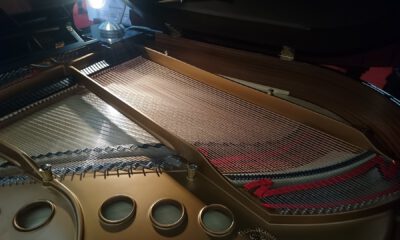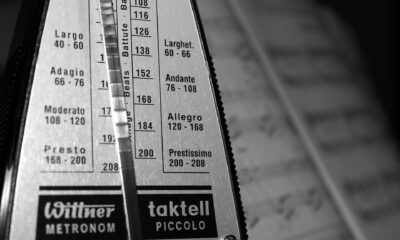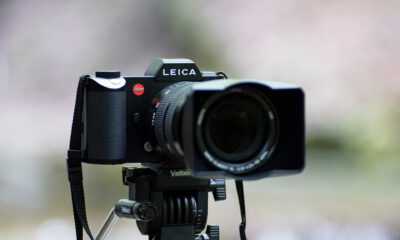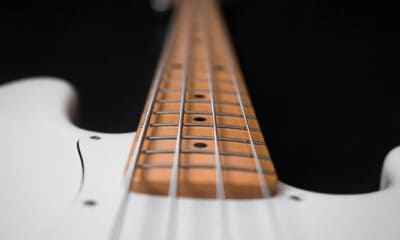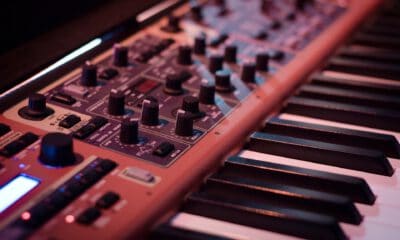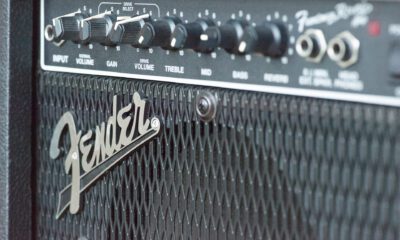Photography
Is A Leica Worth It? (What you should know)
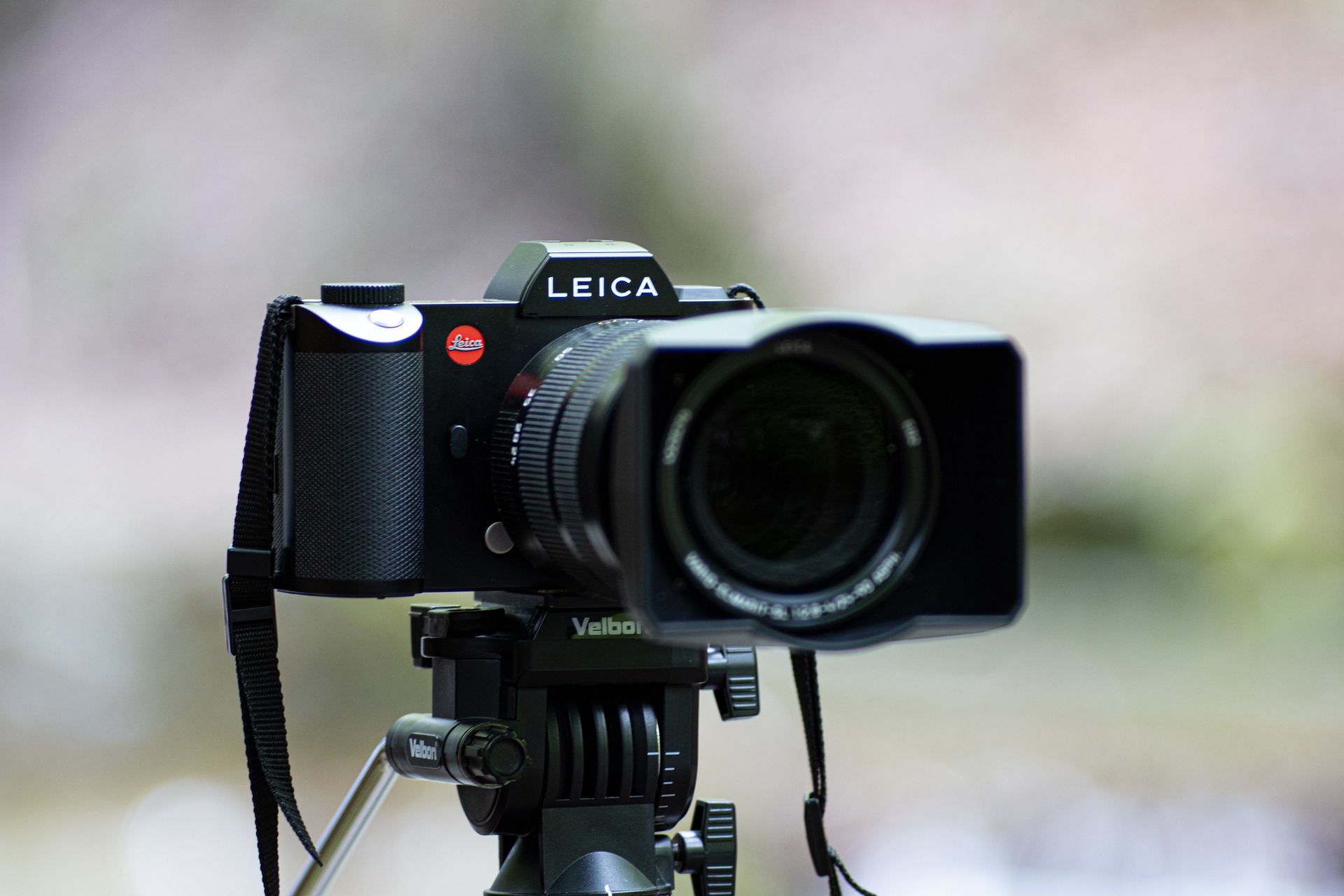
Leica is one of the most traditional manufacturers of premium camera equipment. I myself shoot, besides Canon (and sometimes Sony) also with cameras from Leica.
Because of the high prices of Leica equipment (lenses, cameras and so on), the question is of course whether a Leica is worth the money, or whether you should better buy cheaper alternatives.
Is a Leica worth the money?
If tradition, build quality, longevity of your camera and a special look of the images are important to you, a Leica is worth the money. If you want fast, easy, and more “perfect” photography, you should look at Canon or Sony, for example.
Of course, this is just the short answer. If you want to know why Leica equipment is so expensive in the first place, and what you should look for when buying it, you’ve come to the right place!
Let’s get right to it.
Why are Leica cameras and lenses so expensive?
When you look at the prices of Leica equipment, your first thought will probably be, “What makes this equipment so expensive?”
For example, here are the approximate new prices of some of the most popular lenses and cameras (as of 2021/22):
- Leica Noctilux-M 50mm F/0,95: circa 11.000,00€ / 12.500,00$
- Leica M10: circa 8.000,00€ / 9.000,00$
- Leica S3: circa 18.500,00€ / 20.000,00$
- Leica Summicron-M 1:2/28mm: circa 4.000,00€ / 4.500,00$
As you can see, the equipment is not exactly cheap. The question also arises whether the Leica equipment is really that much better compared to cheaper alternatives.
If you want to see the current prices on Amazon, you can click on the link to the product.
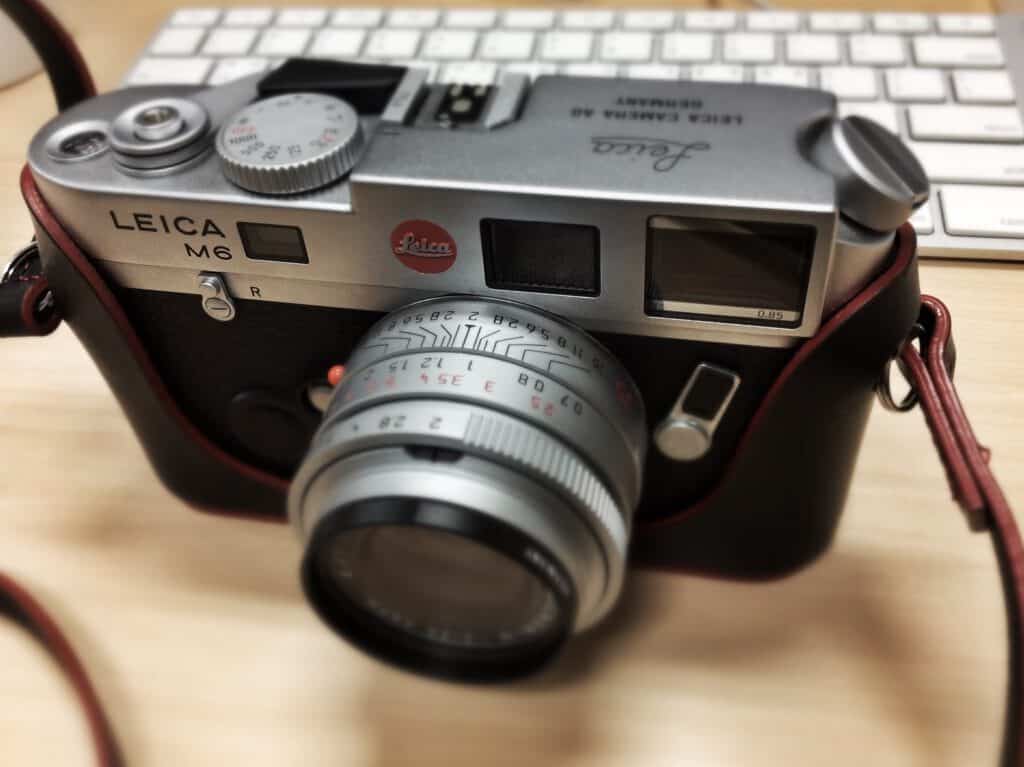
Here are a few examples from other brands (comparable equipment):
- Canon RF 50mm 1.2 L USM: circa 2.500,00€ / 3.000,00$
- Canon EF 24mm f/1.4 L II USM: circa 1.500,00€ / 1.750,00$
- Sony a1: circa 7.000,00€ / 8.000,00$
- Sony a7III: circa 1.800,00€ / 2.000,00$
As you can see, you can get comparable equipment (also from other well-known manufacturers) at lower prices. Of course, 2,500.00€ or 3,000.00$ for a lens is not a small amount of money, but it is not even a quarter of the price of the Leica lens.
Therefore, let’s now clarify the question of what makes Leica equipment so expensive:
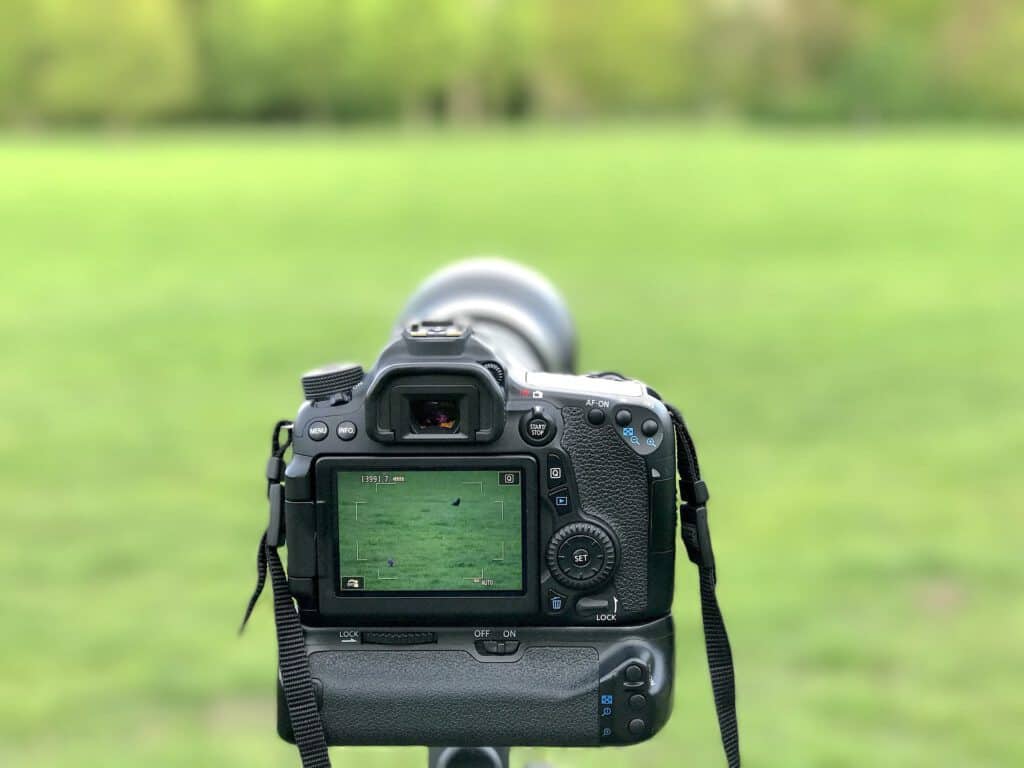
1: Handmade quality
Leica is all about one thing: build quality. None of the other major manufacturers involves as much handwork as Leica.
Handmade is of course more expensive than buying a machine that works 24 hours a day, 7 days a week, without eating, without taking breaks and without sleeping.
If you would like to learn more about manual work at Leica, you can watch this video. It shows just one of the many steps in about 45 minutes:
2: History
Ernst Leitz GmbH from Wetzlar (now Leica) can already look back on a very long history of innovations and high-quality products.
It was Leica that designed, invented and ultimately launched the compact camera as we know it today.
That’s why: As with all luxury brands, you pay for the name. Quite simply, Leica is already associated with around 100 years of photographic history.
If history is important to you, you should definitely go for the Leica if you are thinking of buying one. A replacement purchase will definitely not make you happy in this case. (But more on that later).
3: Durability
You very often see cameras and lenses that are already 60, 70, 80 years old and still work perfectly.
This is also a result of the remarkable quality.
(Of course, it also has to do with the fact that the cameras were usually treated very carefully due to the high purchase price, even back then).
So if you’re looking to buy a lens or camera to eventually pass down to your kids or grandkids, you should also consider going with Leica.
If you want to learn more about the longevity of Leica cameras, you can find a video here in which a camera that is about 85 years old is restored and tried out:
4: Stability of value
Cameras and lenses are not an investment. That’s a fact.
Instead, they are consumer goods that usually lose value relatively quickly. But not always: Especially with Leica cameras and Leica lenses it is often the case that they do not fall below a certain value.
Likewise, 40 or 50 year old Leica “M” cameras, for example, are much more expensive today than when they were new.
5: Name
Of course, this must not be missing. To approach the whole thing objectively, this point simply has to be included:
Leica cameras are a luxury item. And of course, you’re not only paying for the quality, but also to a good extent for the name.
But if we’re honest, it’s the same with all luxury goods.
Now we have looked at why Leica cameras are so expensive in the first place. But that still leaves one question unanswered: are they worth the price?
Is a Leica lens or camera worth the money?
As with almost all questions, there is no right or wrong answer to this.
For this reason, we will now look at the points that you can use to decide whether a Leica is worth the money for you or not.
1: What kind of photography do you want to do?
Most Leica cameras do not have built-in autofocus. So you’ll have to manually adjust the focus for each photo.
That’s why: If you want to take pictures as simply, quickly and easily as possible, a Leica is not the right choice for you.
If you see photography more as a hobby and this “vintage feeling” is important to you, a Leica is more the right choice for you.
2: How important is the video function for you?
Leica cameras are completely designed for photography, not videography.
Even though most Leica cameras now have a video function, you can get much better video cameras for the prices.
That’s why: If you want a camera that you can use for both videography and photography, a Leica is probably not for you.
However, if you mainly want to take photos, a Leica camera may be for you.
3: How important is tradition to you?
Leica is more or less the traditional company in the camera sector.
If tradition is important to you (and you might even want to pass your camera on to your children or grandchildren one day), Leica might be the right choice for you.
If you want to upgrade in 2 years anyway and innovation is important to you, you might as well go with one of the other manufacturers.
If you are interested in the history of Leica, you can watch this video:
4: How important is haptics and design for you?
This was a big point for me before I bought my first Leica.
I was otherwise shooting mostly with the Canon 5D Mark 4 or the Canon EOS R. Of course, these cameras are anything but inferior, but you also clearly notice that the technology is much more important than the feel and design.
With Leica, it’s actually the other way around. The cameras are not really innovative, have fewer options than the competition, but are completely different in terms of feel, design and general aesthetics than, for example, the Canon cameras.
The question is, of course, what is more important to you personally:
If it’s the options and functionality that matter to you, you should stick with Canon, Sony and so on.
However, if the design is one of the most important things for you, you might want to look at Leica.
5: How important are features to you?
I have already mentioned this briefly: Manufacturers like Canon or Sony pack their cameras with many innovative functions.
Leica, on the other hand, almost completely forgoes all functions that you don’t necessarily need for photography.
For this reason, you should ask yourself: Are the functions of my camera important to me, or do I want to focus primarily on the essentials?
If you want the latest of the latest in features, you’re better off sticking with Canon or Sony, for example.
If only the essential features are important to you, Leica is the right choice for you.
6: How important are colors to you?
The colors that come out of a Leica are a major reason for the myth behind Leica.
Of course, you have to realize that if you only have some knowledge of Adobe Lightroom, you can get at least 98% of the look out of it via post-processing.
However, if the colors straight out of the camera are important to you, and you like the “Leica look”, you should go for the Leica.
7: Community and Lifestyle
Leica has its very own community within photographers. If this community (beyond the photography itself) is important to you, you should also rather reach for Leica.
However, there are of course subcultures for other brands as well. But this is usually not as pronounced as with Leica.
If you want to learn more about the community, you can watch this (somewhat exaggerated) video:
Your personal conclusion
In this article, we have looked at whether Leica cameras and lenses are worth the high price.
In conclusion, there is no general answer to this question.
If the brand, the history behind the brand, the excellent build quality, the unique colors coming straight out of the camera, and the durability of your camera and lenses are important to you, and you can do without innovative (and sometimes unnecessary) features, a Leica is right for you.
Leica cameras are relatively stable in value. That’s why you usually don’t make that much of a loss when you buy a Leica. At the same time, you should be aware that Leica cameras are luxury items and not investments.
Therefore, you should only buy a Leica if you can really afford the cameras and lenses (without having to look at every euro, dollar, yen or whatever).
If a repair would put a heavy financial burden on you or you have to justify the purchase to yourself by saying that your camera is relatively stable in value, you should rather wait before you buy your Leica.

Conclusion: When a Leica doesn’t make sense for you
If you just want to take quick photos on the side, a Leica is definitely the wrong thing for you.
Meanwhile, even smartphones, for example new iPhones have such good cameras that they are well suited for quick snapshots.
But even if you want to take “better” photos, there are better alternatives for you (if speed and accuracy is important to you).
As I said, Leica cameras usually don’t have autofocus. Therefore, many of your pictures will be a bit out of focus, especially in the beginning. Also, it will always take a little longer to take your pictures because you have to focus manually all the time.
There are also better alternatives for you if the video function is important to you. Meanwhile, some Leica cameras have video functions, but they are usually not really good, because the cameras are not designed for it.
Another point is that Leica cameras are usually limited to the most essential functions: ISO, shutter speed, aperture.
There is not much more to Leica cameras.
If you buy your camera mainly for special functions, Leica is not really for you either.
As you can see, there are a lot of points to consider when thinking about which camera to buy.
Conclusion And Summary
Leica equipment is primarily for purists. If you want that “vintage feel” from photography, the Leica is pretty much the perfect camera for you.
However, if you just want to take fast, accurate, and equal quality pictures, you might as well look to other manufacturers.
Personally, when I want accurate images, for example for official and business stuff, I mostly use cameras from Canon, like the 5D Mark 4 or the Canon EOS R.
However, when I’m shooting privately, or just want to take “cooler” pictures, I tend to use the Leica.
This seems to be similar for many other (hobby) photographers. If it has to be exact, Canon or Sony is used more, if it has to be as aesthetic as possible, Leica is used more.
I wish you now a lot of fun with the new knowledge. As I said, the quality of Leica cameras is very good, but whether it is worth the price for you, you must decide for yourself.

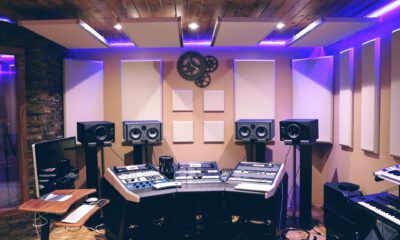
 Home Recording2 years ago
Home Recording2 years agoCan You Use Normal Speakers As Studio Monitors? The Simple Answer

 Music Production2 years ago
Music Production2 years agoCan Piano Sheet Music Be Used For Other Instruments?
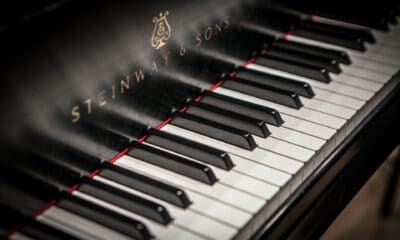
 Music Production2 years ago
Music Production2 years agoAre My Piano Keys Made Of Ivory? (How To Recognize It)
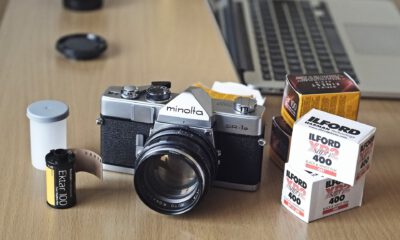
 Beginner2 years ago
Beginner2 years ago13 Valuable Analog Photography Tips For Beginners

